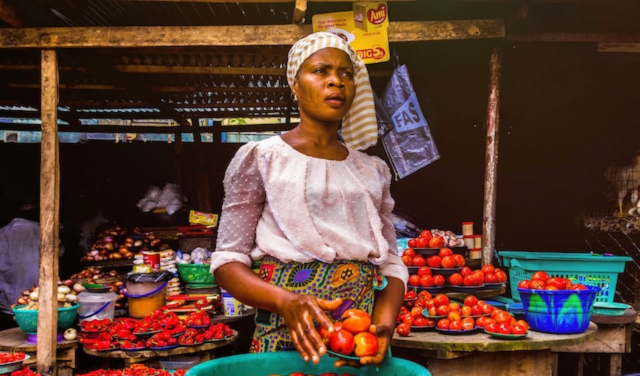Worldwide, governments spend more than US$817 billion annually to support the agriculture sector. The Food and Agriculture Organisation (FAO) estimates this support could reach USD 1.8 trillion by 2030. In 2015, sub-Saharan Africa spent an estimated US$680 million on agricultural subsidies alone.
Much of this agricultural support is driving greenhouse gas emissions and encouraging agricultural practices that degrade already stressed natural environments. For example, many fiscal subsidies typically support commodities such as staple grains or exportable cotton. This can have higher impacts on water use and land-use change. It can also deplete soils and promote greenhouse gas emissions. At the same time, this support does not produce the foods that are required for healthy diets. In Africa, over 30 per cent of children under 5 years of age experience stunting. Around 21 per cent of women and 9 per cent of men live with obesity in the region. The ill health caused by poor diets impacts productivity and elevates healthcare costs, further impacting the potential for economic growth.
Agricultural subsidies in sub-Saharan Africa
In sub-Saharan Africa, the economic impacts of diabetes alone are expected to exceed US$52 billion by 2030. In part, this is because the mix of foods produced in sub-Saharan Africa currently do not adequately match the population’s nutritional needs. This situation is unsustainable. There is a need for action at country, regional and global levels to phase out the most distortive, environmentally and socially harmful agricultural support, including price incentives and coupled subsidies. Instead, there could be a redirect towards investments in agriculture, such as innovation and infrastructure, and decoupled subsidies.
Potential for subsidies to drive positive change
This was the subject of a recent event, hosted by the Global Panel on Agriculture and Food Systems for Nutrition (GloPan) and FAO Regional Office for Africa (FAORAF). The meeting had FAO representation from countries such as Guinea, the Democratic Republic of Congo (DRC), Malawi, Niger, Tanzania, Burundi, The Gambia, the Republic of Congo, and Ghana. Together, they focused on a brief, produced GloPan entitled ‘Exploring the Potential Benefits of Repurposing Agricultural Subsidies in Sub-Saharan Africa’. The brief explores this issue in depth, by using mathematical modelling to test different agricultural support scenarios. It concludes that reallocating agriculture sector support should become a key part of the ongoing dialogue on food system transformation and should be a key consideration as countries deliver on their commitments in the Maputo and Malabo Declarations.
Transforming our food systems, so they produce the foods needed for healthy diets as well as protecting our natural environment and supporting economic growth in sub-Saharan Africa is complex, with many overlapping, region-specific, policy areas. And this all sits within a veil of global uncertainty. The conflict in Ukraine and the pandemic continue to create stresses on our social, health and economic systems. Inflation is increasing globally. In 2022, inflation in Africa reached 14.5 per cent, the largest annual change since the 2008 recession.
More evaluation on subsidies is still needed
Despite these challenges, colleagues at the Global Panel/FAORAF event agreed that agricultural support is a critical area that could have a significant positive impact on our food systems. However, they also noted that a nuanced approach that is informed by the best science — including collecting more data and conducting additional research — is key to addressing trade-offs and avoiding any pitfalls or unintended consequences.



